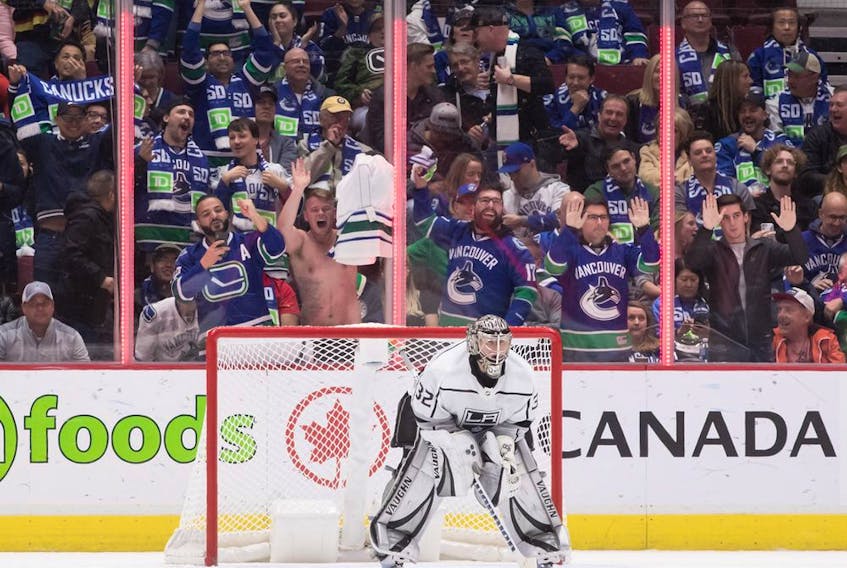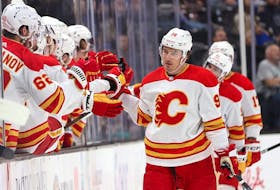Now that we know most people in this province won’t be vaccinated against COVID-19 until the end of the summer , when you read the B.C. Restart Plan it’s difficult to see how there will be fans cheering on the Vancouver Canucks at Rogers Arena at any point in the 2020-21 NHL season.
The plan, first released in May and updated in November, seems clear. Events that bring together large gatherings of people, like professional sports, won’t be allowed until the province has entered into Phase 4, the final stage of our recovery from the novel coronavirus pandemic.
Only when at least one of three things occurs in B.C. will we move to Phase 4: either there’s widespread vaccination (current estimates suggest this won’t be until the end of the summer), the community develops broad immunity through infections (the imminent arrival of vaccines has ruled out this chance, which would have been a disaster anyway ) or broad successful treatments are developed (none yet).
Only when widespread vaccination has occurred, which isn’t likely before the end of next summer, we’ll be in Phase 4. Then B.C. can again host conventions, attend live sports and concerts, and host tourists from abroad.
The NHL has been hopeful for months that they’d be able to have some fans in the stands in some arenas this season, but as the COVID-19 situation has worsened in most parts of North America, how likely that is remains unclear.
The NBA had hoped to open its season later this month with some fans in the stands, but most teams have yet to release any formal plans .
So, in that regard, B.C.’s stance on fans in the stands isn’t exactly an outlier. Vaccinations are expected to begin by January, starting with at-risk people and health care workers.
It’s almost certain there won’t be enough people vaccinated to start removing restrictions on the size of public gatherings before summer.
Way back in April, Dr. Bonnie Henry, the provincial health officer, was asked when she thought indoor facilities like casinos would open again. They’re big revenue drivers for municipalities and non-profits, it was pointed out as part of the question.
“That is one of the ones that have been closed under a public health order and it would be last on my list to consider for reopening at this point because we know that type of environment is a closed environment — an inside environment,” she said then.
Given the behaviours of people in casinos — people in proximity, lots of loud talking, drinking and cheering — there’s a lot of easy parallels to be drawn with sports arenas.
Henry’s deputy, Dr. Réka Gustafson, explained in August the most risky environments for transmission: “COVID-19 transmission is highest-risk in close settings where people are in proximity, especially if they are interacting quite a bit or are touching many things. And especially if some of the behaviours are altered by alcohol.”
Again, that sure sounds like a sports arena.
Playing as many 28 home games without fans — the latest chatter suggests the NHL is looking at a Jan. 15 start, with teams playing 56 games — will be the bitterest of pills to swallow.
The Canucks didn’t have a comment for this story, but it seems likely they are hopeful that even though the official restart plan says no large gatherings until Phase 4 that there might be a willingness from public health officials to consider some fans in the building at some point this season.
In September, the Canucks acknowledged they’ve been working on plans that would allow for some fans in the building and those plans remain in place. Part of the process in developing those plans will have been to speak with public health officials.
Last month, Ottawa Senators owner Eugene Melnyk insisted that things like rapid testing would make it possible for teams to get fans in the building. The Senators have a plan to have as many as 6,000 fans in their arena, though it’s not clear if public health officials would sign off on having that many people in a building.
In the end, it’s worth nothing that while Henry is never a fan of speculating on what-if scenarios, in her April comments she did leave the door open to a future with limited reopenings: “I would have to be convinced that there is a valid reason and a safe way to do it and I think that is something for further down the line.”
Stripped down
The latest reports suggest the NHL is now looking at a Jan. 15 start for the 2020-21 season, even as the league and its players’ association is at odds over how to handle what is surely a worst-case scenario for revenue.
After a final round of terminations to non-hockey operations staff next week — a process that began in late July — the Canucks will be down to about 40 people from what was once a full-time staff of 200.
Those terminations includes staff in areas like ticket sales, ice and arena maintenance, game production and more.
Even the man who plays Fin is out the door, though the mascot worker is being offered work on a per-appearance basis. (Meaning, the Canucks for Kids Fund stressed in a tweet, Fin is still available for birthday drive-by bookings.)
The mass reduction in staff is a statement about how harsh revenue projections appear to be for 2020-21 and how, more than ever, cost-conscious ownership is.
CLICK HERE to report a typo.
Is there more to this story? We’d like to hear from you about this or any other stories you think we should know about. Email [email protected]
Copyright Postmedia Network Inc., 2020









